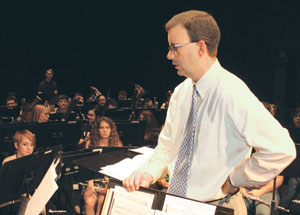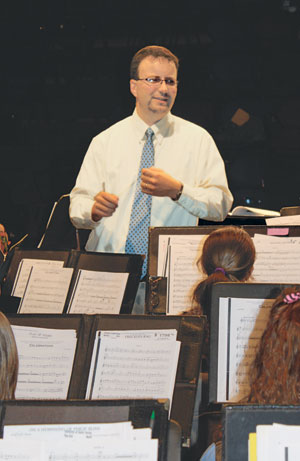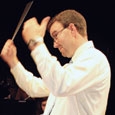 When I directed middle and high school bands, I regularly invited college directors, other school teachers, and area professional musicians to guest conduct my ensembles. Placing other conductors in front of my bands gave my students an opportunity to see diverse ideas and rehearsal strategies and also contributed to my growth as a musician and teacher. Now that I am teaching at the University of South Florida, I enjoy the opportunity to work with many bands across the state, forming new professional relationships and returning to my first love, working with school-aged students.
When I directed middle and high school bands, I regularly invited college directors, other school teachers, and area professional musicians to guest conduct my ensembles. Placing other conductors in front of my bands gave my students an opportunity to see diverse ideas and rehearsal strategies and also contributed to my growth as a musician and teacher. Now that I am teaching at the University of South Florida, I enjoy the opportunity to work with many bands across the state, forming new professional relationships and returning to my first love, working with school-aged students.
Preparation
Directors wishing to bring in a clinician for a one-day visit should make first contact by telephone or email ready with a couple of different dates and times in mind. Getting schedules lined up is always the first thing to handle. The next important hurdle is to make sure the clinician knows whether you will be in the rehearsal room, the marching field, or somewhere else. Be sure to give the clinician clear directions on how to get to the rehearsal spot. I always get the cell phone number of the director in the event something should go awry, even if communication is primarily by email.
Clinicians are there to help the band in any way they can, and they prefer to know what needs the most attention. It is essential that the clinician knows what pieces the band will be rehearsing in advance, so he can study the scores before stepping in front of the ensemble. A clinician may be able to teach something familiar or easy without reviewing the score beforehand but will need extensive preparation to conduct a new piece. Also, tell the clinician if there is a specific movement or section that you would like to see addressed.
 When working with a marching band, the clinician needs to know which elements (drill, music, percussion, visuals) the director wants to be addressed. Most clinicians can help in any capacity, but it is usually more productive for them to focus on one area than trying to fix everything at once. The visit can be most productive when the clinician knows what role to be in. Directors should designate if the clinician is to act as a judge, whether he should be in the tower or on the field, or if the focus should be on footwork, balance, or drill design. Although there are many men and women capable of addressing all of these areas, very few of them can do so effectively in a two-hour rehearsal.
When working with a marching band, the clinician needs to know which elements (drill, music, percussion, visuals) the director wants to be addressed. Most clinicians can help in any capacity, but it is usually more productive for them to focus on one area than trying to fix everything at once. The visit can be most productive when the clinician knows what role to be in. Directors should designate if the clinician is to act as a judge, whether he should be in the tower or on the field, or if the focus should be on footwork, balance, or drill design. Although there are many men and women capable of addressing all of these areas, very few of them can do so effectively in a two-hour rehearsal.
I ask hosts to prepare a rehearsal schedule for me to ensure that we rehearse all of the important sections, especially if I am asked to address a long list of problems in a relatively short amount of time. It is best when the director orders the schedule from the piece that requires the most attention to the one that needs the least. For example, a few wrong notes in the march will likely correct themselves, so place that at the end and begin with a difficult section of one of the more challenging pieces.
While I was teaching in public schools I found it frustrating when clinicians would spend 45 minutes on the march and barely work on the more difficult pieces. Later I realized this happened because I never communicated with my guests about the specifics that I wanted them to address. The end result was that students didn’t learn as much from these clinicians as they could have.
I will also call to confirm everything a few days before the event because I have encountered band directors who forgot the date we agreed upon. It is advisable to touch base right before the visit to make sure that everybody is on the same page.
When to Bring in a Clinician
Although I am happy to work with a marching band at any point in the season, the ideal time seems to be three quarters of the way through development of the show. At this point the director has been listening to the same pieces several times a week for two months, and a fresh set of ears can be tremendously helpful. Directors can get bogged down in minor details, and a new listener can offer a perspective on what shape the show is actually in and where the real problems still lie.
On first seeing a show, clinicians hear what the audience and judges will hear, meaning they will typically notice general problems more than minute details. Perfect intonation in the third clarinets doesn’t matter if they can’t even be heard in that measure. Directors hear the music so often that they may lose perspective, while fresh ears may think to add a musical effect in one place or assure the director that the show is in better shape than they think. It is common for directors to harp on minor details and miss the big picture.
Precedence should go to the clinician if there is a conflict of opinion, although the director may change back to his preferred way afterwards. I find that disagreements occur most often at marching clinics when directors include effects the band cannot handle. Facing backfield for 3⁄4 of the show may work for a drum corps but the high school horn line may not have enough power to manage that. Similarly, a drum corps like the Cadets may be able to place their drumline at the front of the field during the ballad, but they can play softer than most high school drumlines.
One of the greatest lessons I had as a high school band director came from a band parent who was a former band director and had taken a group to the Midwest Clinic. One day he pointed out that I was humming on the podium, and this was keeping me from hearing what the band was actually playing. I was not aware how bad this habit had become and have worked hard to overcome it.
A director should never expect fish for negative comments about colleagues or other programs from a clinician. We are there to help you get better, not to compare your groups to others.
Rehearsal
My preference is for the host directors to warm up the band and run through the pieces I will be working on while I sit and listen for the first portion of the rehearsal. As the director has the ensemble play through the music I can focus better on the dynamics and articulations than when I am on the podium. This allows the clinician to get a much broader perspective of what needs to be addressed and to get a feeling for the technical and musical capabilities of the ensemble.
Directors should not waste time making excuses for every problem, musical or otherwise, that arises. The majority of clinicians have been in similar situations with their programs and are well aware that they are dealing with imperfect people and less-than-ideal situations. It is imperative to spend as much time as possible focusing on solutions rather than problems.
The worst scenario I have encountered was when I sat through a two-hour long rehearsal and was expected to correct every problem in the last five minutes. This is impossible and a waste of the clinician’s time. Clinicians are happy to simply observe a rehearsal and make comments but should be given ample time in which to do so.
The director should be responsible for dealing with discipline problems by quickly removing the disruptive student from the room. Otherwise it wastes rehearsal time. Some clinicians are willing to help with discipline, but directors looking for help in this area should make this known in advance. I have helped young teachers who wanted some ideas for maintaining discipline by leading the band while they observed.
Compensation
Payment should be clearly agreed upon before the clinic and the best way for a director to bring this up is to ask if the clinician charges a set fee. This allows the clinician to name an amount or let the host know that there will be no charge. If the director solicited the visit, payment is probably expected, but many college directors do not expect to be paid because they consider classroom visits to be recruiting opportunities and so part of their job. However, if a clinician does not accept payment, offering to reimburse the clinician for gas is often a welcomed gesture if the travel time is more than an hour. Although many college professors enjoy making such trips and see them as recruiting opportunities rather than a chance to make some extra money, clinicians who are high school teachers, graduate students, composers, and professional players do not have recruiting duties and will probably charge a fee.
With a little planning and communication a good clinician can make a significant difference in a band in a short amount of time. Bringing clinicians into my room was often as much of an education for me as it was for my students.






